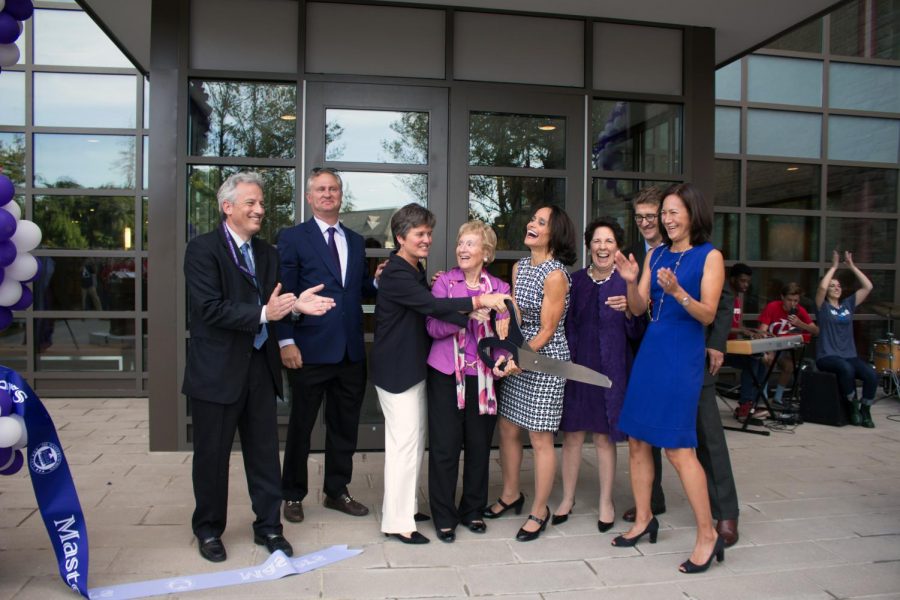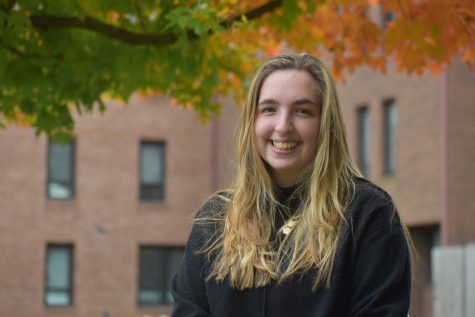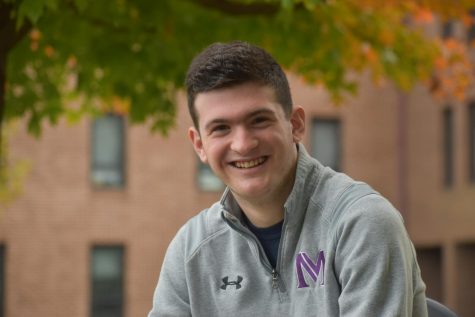Community responds to $20 million donation for new IEC
Pictured at the ribbon cutting ceremony for the opening of the Fonseca Center in 2015 are Tim Kane, Jonathan Clay P’19, Head of School Laura Danforth, Diana Davis Spencer ‘56, P’84, former Head of School Maureen Fonseca, Lynn Pilzer Sobel ‘71, P’99, ‘05, Chief Financial Officer Ed Biddle, and former Head of the Board of Trustees Tracy Tang Limpe ‘80, P’18. The Diana Davis Spencer Foundation donated $10 million to the construction of the Fonseca Center.
March 8, 2021
Masters recently received a $20 million dollar donation, the largest in the school’s history, from the Diana Davis Spencer Foundation (DDSF) to fund the construction of a new Innovation and Entrepreneurship Center (IEC).
Executive Chairman Diana Davis Spencer ‘56 P’84, and her daughter Chief Executive Officer and President Abby Spencer Moffat ‘84 are both alumnae of the school. Spencer has served on Masters’ Board of Trustees for over 15 years.
The Foundation has a decades-long history of giving to the school, including a $10 million donation to the construction of the Fonseca Center, along with sizable donations towards the renovation of the boys’ dorms in 2018, the girls’ dorm in 2019 and the most recent renovation of Masters Hall.
Director of Institutional Advancement Seth Marx said, “This gift is the culmination of years and years of work, together with the family, and a number of board leaders and trustees and also the increasing involvement over the years with the family.”
The donation has elicited a mixed response from students and alumni; while some praised the Foundation for their generosity, others brought up concerns regarding the prominent conservative organizations the Foundation has supported and served, including the Heritage Foundation and the Federalist Society.
Criticism has also cited Moffat’s involvement with several conservative-leaning institutions––she has served as a Trustee of the Heritage Foundation since 2009, and has held positions on the boards of the Media Research Center and the Intercollegiate Studies Institute, among other organizations.
On their website, the DDSF asserts that their philanthropy aims to “promote national security, entrepreneurship, self-reliance, free-enterprise, and to enhance the quality of life by supporting the arts, education, global understanding, health advancements, and preservation of the environment.”
Several weeks after the gift was announced to the greater community, two alumnae, Carly Matsui ‘18 and Sarah Faber ‘20, authored an open letter to the school petitioning them to refuse the donation, and remove Spencer from the Board of Trustees, among other demands. The demands have since changed, and the petition now requests that the money be “accepted (in part or in its entirety), but without the strings attached that it must go to the IEC.” It continued, “Entrepreneurship is one of the DDSF’s political areas and there are many other prominent causes, like funding scholarships and giving teachers fair wages during COVID-19.”
The open letter was signed by 81 members of the community––a combination of students, alumni and parents.
Head of School Laura Danforth and other school administrators have stated that the Foundation has not asked for, nor has it been granted, any control over Masters’ programming through the new facility.
Marx did indicate that the space may also be used outside of school hours by students who would not otherwise have access to such educational resources through the Network for Teaching Entrepreneurship (NFTE), a nonprofit focused on bringing entrepreneurship to kids in low-income communities that the DDSF supports in their philanthropy.
Spencer received the Lowell B. Mason Award for Exemplary Board Service from NFTE on March 4 for her 25 years of work with NFTE, especially for her work helping first-generation students attend college. In her acceptance speech, Spencer reminisced about her time teaching entrepreneurship to students at a Washington, D.C. public high school, calling NFTE “a beacon of hope giving students the tools to own their future.”
Entrepreneurship is outlined as one of the Foundation’s key areas of philanthropy, which Marx said has also emerged as a one of the school’s focal points for expansion and innovation.
“[Diana Davis Spencer] believes that what the world needs most is dynamic problem- solvers,” Marx said. “Even though the nomenclature is trendy and new for design thinking, she’s been talking about design thinking for years.”
Danforth echoed Marx’s sentiments, highlighting Spencer’s commitment to empowering students through entrepreneurship.
“That’s kind of our future, having kids think creatively, having young people think independently and take charge of their own lives––I think it’s always been an important part of [Spencer’s] philanthropy,” she said.
Senior Carly Grizzaffi, the Co-President of both the Girls who Code club and Girls in STEM club and a student in the current innovation and entrepreneurship program, voiced her enthusiasm about the IEC. She said she hoped the new building would provide increased opportunities for members of the community to get involved in innovation and entrepreneurship, especially for girls in the Middle School who may not have had the opportunity to try their hand in IEC programs otherwise.
“That’s what I’m most excited for––just to get more young girls involved so soon is really exciting for me.”
Faber, who wrote a section of the open letter detailing what she claimed were the Foundation’s intentions to advance conservatism through education, cited the Foundation’s focus on entrepreneurship as one of her major concerns as she was constructing the letter. She emphasized the apparent intersection of the Foundation’s entrepreneurial interests and political alignment.
“I think the fact that the money is supposed to be used specifically for this new entrepreneurship center, and it’s coming from a place that wants to bring more conservative values into entrepreneurship through education is concerning,” she said.
Senior John Vogel said he feels the “founding values” of the Foundation, which are defined on the DDSF website as “freedom and individual responsibility,” are concerning.
“Ultimately, it comes down to influence and this is where the Diana Davis Spencer Foundation is very clear; their intent to influence extends to all things political, and educational is no exception,” he said. “Their website often mentions that through education, and a focus on entrepreneurship in particular, they hope to instill libertarian values.”
Lakeya Graves ‘07 works at King School in Stamford, Conn. as the director of marketing, and also serves as a team leader for the school’s diversity and inclusion professional, growth and development task force. She emphasized the need for diversity, equity and inclusion to be a priority when new programming for the IEC is developed.
“I would expect that with every program that is newly created we need to make sure that it is inclusive.”
In ‘A Better Masters: An Action Plan for an Inclusive Community,’ which the administration released in July following a series of posts on the @blackattms Instagram account, the school rolled out six action steps to reform its curriculum and pedagogy regarding issues of diversity, equity and inclusion.
One of the steps outlined plans for the school to “ensure its curriculum across all disciplines more fully includes voices and works from individuals and groups that have been systematically excluded, including material and content that reflects a greater diversity of thought and experience, provides opportunities for student choice, and tackles essential contemporary questions of social and racial justice.”
Graves also emphasized the Foundation’s right to support a range of causes, including conservative ones, and still support the school financially.
“Obviously, I may not agree with all the organizations they donate to. But again, if they’re willing to donate this amount of money, and they are alums and families of Masters, I’ll still appreciate the gift and would like to see it used for good.” She continued, “I don’t think we dig around in every single donor’s life like that.”





